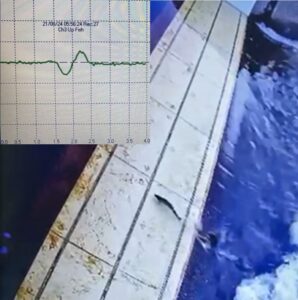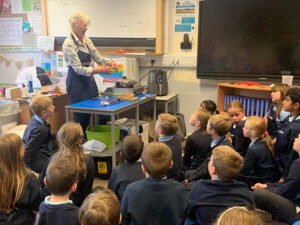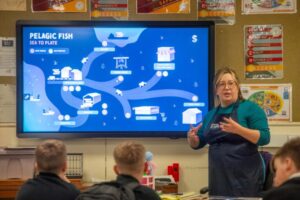Marine Scotland Blog
Highlights from the MASTS Annual Science Meeting 2024
Marine Directorate scientists recently attended the MASTS (Marine Alliance for Science and Technology for Scotland) Annual Science Meeting, where they explored critical marine science topics like blue carbon, sustainable marine resources, and marine ecosystem health. This gathering emphasized the importance of innovative research in addressing marine sustainability and climate change challenges.
Workshops Towards Shaping Our Perspectives
Marine Directorate colleagues participated in three significant workshops that provided insights into some of the most pressing issues in marine science today:
- Workshops Towards Shaping Our PerspectivesBlue Carbon Knowledge Gaps: This session focused on improving data for blue carbon ecosystems, essential in carbon sequestration and climate mitigation.
- Sea Lice Monitoring Innovations: Participants discussed advanced tools for sea lice detection, vital for managing populations and protecting wild salmon stocks.
- Sustainable Marine Resource Management: Strategies and policies for ecological stewardship were examined to balance resource use with marine ecosystem health.
These workshops provided actionable insights that our team plans to incorporate into future policy and marine management initiatives.
Showcasing Our Expertise
Our colleagues shared their knowledge through several key presentations:
- Prof. Mark Inall presented on the role of Chief Scientific Advisor for Scotland’s Marine Directorate, emphasizing science’s influence on policy.
- Meadhbh Moriarty discussed using ensemble modelling to reduce uncertainty in sea lice dispersal patterns, a critical aspect of effective sea lice management.
- William R. Macdonald highlighted the broader ecological impacts of offshore wind farms on stratified shelf seas.
- Alexander Murray introduced the “Knowledge Strength” approach for refining policy advice, particularly in salmon lice dispersal.
- The meeting concluded with Bee Berx providing insights into ocean warming in Scottish waters, examining the effects of temperature changes on marine ecosystems.
Representatives from other directorates, such as the Offshore Wind Directorate and the Directorate for Culture and External Affairs, presented updates on Scotland’s marine energy research and Arctic connections.
In addition to these talks, Susanna Quer from the Renewable and Ecology Group presented an e-poster on Comparative Effects of the Processing Power of C-PODs and F-PODs on the Detection of Porpoises and Dolphins. This research investigates the effectiveness of two different passive acoustic monitoring devices in detecting cetaceans, a key component in monitoring marine biodiversity and informing conservation efforts.
Innovative Marine Research and Future Directions
We extend our gratitude to MASTS for hosting such an impactful event and to all the attendees for fostering a collaborative and forward-thinking environment. Our colleagues look forward to applying these insights and furthering our commitment to sustainable marine management in Scotland.
The post Highlights from the MASTS Annual Science Meeting 2024 appeared first on Marine.
Marine Fund Scotland helps serve up ‘Seafood in Schools’
Marine Fund Scotland has awarded over £55m, since 2021, to support projects that contribute to an innovative and sustainable marine economy, support coastal communities, and contribute to Scotland’s net zero ambitions.
In 2022 Seafood Scotland identified a gap in the education system for children to learn about the seafood sector. They wanted to raise awareness of the health benefits of eating fish, how sustainable it is as a food group and how fish can provide affordable protein for family meals.
After applying for and receiving £47,500 of MFS funding they launched an initial Seafood in Schools pilot programme during 2023-2024. This took place across primary and secondary schools with a series of workshops to educate and promote seafood to school age children.
Each programme was supported by suppliers within the seafood sector – providing products to be used within the workshops and as part of take-home packs for the primary school pupils to encourage them to cook fish at home.
The first year of the programme saw:
- Sixteen participating primary schools, reaching over 800 pupils between P4 and P6.
- Two participating secondary schools, reaching over 500 pupils in S2
- 100% positive feedback from teachers and head teachers on the workshops
- Positive engagement from industry supporting programme with product for the workshops.
Donna Fordyce, CEO of Seafood Scotland, said: “Following the successful pilot scheme and delivery of the primary schools programme, Marine Fund Scotland provided funding to support the development and roll out of pilot workshops across secondary schools to help extend the Seafood in Schools initiative.
“Engaging with school children and their influencers is vital for our sector. They learn how tasty our seafood is, and more about its nutritional value; that it’s versatile and economical to cook, and how vital and varied this sector is in terms of the species you can find around Scotland.
“This is important on so many levels: not only to ensure young people are eating seafood, but also – at a time when we’re seeing huge skills shortages across the industry – it’s imperative that we educate young people on the career opportunities available to them within the seafood sector.
“We are grateful to the Scottish seafood sector for supporting this initiative and supplying free products for us to use in schools, helping us to inspire the younger generation.
“Following these workshops, we have had funding confirmation for this financial year. This will allow us to expand the secondary school workshops into more areas, helping us encourage school leavers to find work in the sector and continue to build on our vital industry.”
Going Forward
The second Marine Fund Scotland award of £50,000 will allow Seafood Scotland to build on the success of the workshops and evolve the 2024-2025 programme of activity. The 2024-25 strategy focuses on reaching more pupils by creating tools to help teachers spread the word. By creating an accessible team of experts and useful resources for teachers, the Seafood in Schools programme will have far reaching benefits for the seafood industry.
The post Marine Fund Scotland helps serve up ‘Seafood in Schools’ appeared first on Marine.
Outcome of Coastal States consultations on mackerel, blue whiting and Atlanto-Scandian herring
Consultations between the Coastal States and Fishing Parties in the North-East Atlantic: the UK, EU, Norway, Iceland, the Faroe Islands, Greenland and Russian Federation, have now concluded with agreement on 2025 catch limits for shared pelagic stocks.
Agreed records for mackerel, blue whiting and Atlanto-Scandian herring were all signed by the end of discussions on 22 October 2024, and set out Total Allowable Catches (TACs) and management measures for 2025 on these three stocks of key importance to the Scottish fishing fleet.
For all three stocks, the TACs were set in line with advice from the International Council for the Exploration of the Sea (ICES), resulting in the following changes compared with the catch limits set for 2024:
- Mackerel -22.00%
- Blue whiting -5.40%
- Atlanto-Scandian herring +3.00%
The agreed records also underline the importance that Parties are placing on agreeing new and comprehensive sharing arrangements for these stocks. This remains a key priority for Scotland, and officials will continue to put full energy behind the discussions to ensure the long-term sustainability for the benefit of Scotland’s fishers into the future.
Negotiations will continue in the coming weeks with bilateral and trilateral negotiations aiming to agree further fishing opportunities and management measures for 2025.
The post Outcome of Coastal States consultations on mackerel, blue whiting and Atlanto-Scandian herring appeared first on Marine.
Counting Scotland’s Salmon
It is well established that the numbers of Atlantic salmon returning to Scottish rivers are declining, and that this is part of a pattern across the whole of their natural range. In response, the Scottish Government and stakeholders have introduced a range of voluntary and mandatory measures to enhance and protect salmon stocks, many of which are also likely to benefit sea trout and other freshwater fish. These measures include restrictions on the fishing season, on retaining fish and mitigation of pressures such as sea lice and rising river temperatures.
Each year, Marine Directorate scientists assess the status of 173 salmon stocks across Scotland, resulting in individual rivers being graded as being in good (category 1), moderate (2), or poor (3) conservation status. Fisheries on poor conservation status rivers must return all salmon caught in order to help preserve stocks. Whilst salmon can be retained on rivers in good or moderate conservation status, more than 95% of all rod-caught salmon in Scotland are returned to the river.
The main source of information on how many adult fish return to each river are salmon fisheries, who have a legal requirement to make an annual catch return to Scottish Ministers. This information is then collated by the Marine Directorate and published as Official Statistics each Spring. As not every returning salmon is caught, other information is required to understand how catches relate to the numbers of adults returning from the ocean to spawn. To provide this information, some rivers have equipment installed on them to allow semi-automated fish counting. In July and August this year, the Marine Directorate and the Helmsdale District Salmon Fishery Board have had the fish counter on the River Helmsdale refurbished to help ensure the continued provision of this valuable data.
Contractors have installed new insulation panels and electrode strips on the concrete weir, replaced electrical cabling and CCTV cameras, and installed the monitoring and remote communications equipment into a new hut on the riverbank. Using the insulated electrodes, the counter continuously monitors the electrical resistance of the water and when fish cross the electrodes characteristic signals are recorded. The signal shape varies depending on whether the fish first crosses the lower or upper electrode, allowing the movement direction to be determined; the size of the signal also relates to the size of the fish. The photograph below shows one of the first fish to be detected since the refurbishment was completed, together with its corresponding signal on the fish counter.

Overhead image of a sea trout crossing the weir, with inset image of the corresponding signal on the fish counter.
During the remainder of this year’s salmon run, the Helmsdale Board and the Marine Directorate will collect signal and video data allowing the efficiency of the counter to be validated. The data from next year’s fish run can then be used to help assess salmon stocks on the Helmsdale and across Scotland, and to monitor the effectiveness of efforts to protect and enhance stocks, such as those described in the Scottish wild salmon strategy.
The post Counting Scotland’s Salmon appeared first on Marine.




